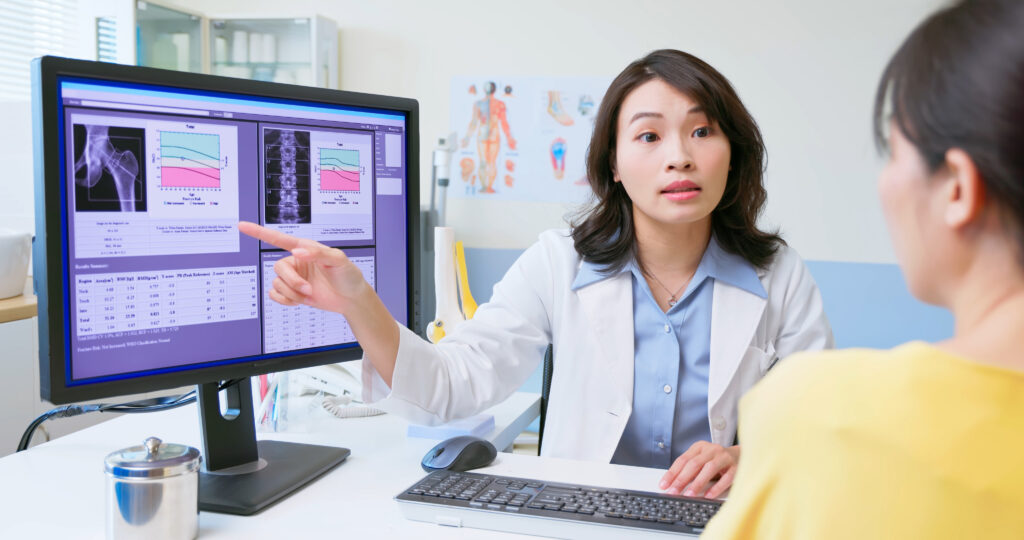Osteoporosis and Bone Health in Postmenopausal Women
Hormonal changes after menopause increase the risk of bone loss in women. A Dexa scan helps detect issues early, making it vital for preventing osteoporosis and preserving bone health.
The Vital Role of Dexa Scans in Early Detection and Prevention
As women enter menopause, their estrogen levels decline significantly, causing many changes in the body. While symptoms like hot flashes are well-known, a critical but often overlooked issue is bone health. Postmenopausal women face a much higher risk of osteoporosis, a condition that weakens bones and increases the chance of fractures.
Fortunately, Dexa scans offer a simple and effective way to detect osteoporosis early to help protect bone health.
Understanding Osteoporosis
Osteoporosis is a condition where bones become fragile and brittle due to loss of bone mass and density. It often progresses without noticeable symptoms until a fracture occurs, commonly in the hip, spine, or wrist.
Postmenopausal women are particularly vulnerable because estrogen, a hormone that helps protect bones, sharply declines after menopause. According to the National Osteoporosis Foundation, 1 in 2 women over the age of 50 will break a bone due to osteoporosis.
Why Bone Health Matters After Menopause
Healthy bones are essential for maintaining mobility, independence, and overall quality of life. As women age, the risk of falls and fractures increases, not just due to weaker bones, but also due to muscle loss and balance issues.
Fractures in older adults can lead to serious complications, including chronic pain, loss of independence, and even increased mortality in the case of hip fractures. That’s why preventive screening such as a Dexa scan and early diagnosis are key.
What Is a Dexa Scan?
A Dexa or DXA scan (Dual-Energy X-ray Absorptiometry) is the gold standard for measuring bone mineral density (BMD). It’s a quick, painless, and non-invasive test that compares your bone density to that of a healthy young adult and others your age.
A Dexa scan allows doctors to evaluate your risk of osteoporosis and fractures, making it possible to intervene early with lifestyle changes, supplements, or medication. Take our quick quiz to assess your bone health and see if a DEXA screening is recommended for you.
Protecting Your Bones: Prevention and Treatment
While aging is inevitable, bone loss doesn’t have to be. Here are steps you can take to maintain strong bones:
Calcium and Vitamin D: Ensure you’re getting enough through diet or supplements.
Weight-bearing Exercise: Activities like walking, dancing, and strength training help build bone.
Healthy Lifestyle Choices: Avoid smoking and limit alcohol intake.
Medications: In some cases, doctors may prescribe medications that slow bone loss or increase bone formation.
Is a Dexa Scan Right for You?
Not everyone needs a Dexa scan right away—but for many women, especially after menopause, it can be a crucial step in protecting bone health. Experts recommend that all women aged 65 and older get screened. If you’re under 65 and postmenopausal, you may still need a scan if you have risk factors such as:
- A history of bone fractures
- A family history of osteoporosis
- Smoking or frequent alcohol use
- Low body weight or poor nutrition
- Certain medications or chronic health conditions, like rheumatoid arthritis

Take Control of Your Bone Health After Menopause
Osteoporosis is a silent but serious threat to postmenopausal women, often going unnoticed until a fracture occurs. The good news is that with simple, non-invasive screening like a Dexa scan, you can catch bone loss early and take steps to prevent long-term damage.
Protecting your bone health means protecting your independence, mobility, and quality of life. If you’re approaching or already past menopause, now is the time to take action. Dexacan can help. Book an appointment today.



